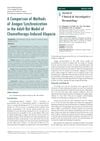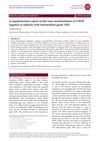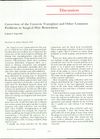 8 citations,
April 2014 in “Anti-Cancer Drugs”
8 citations,
April 2014 in “Anti-Cancer Drugs” A hormone linked to collagen helps hair grow back in mice after chemotherapy, and may also prevent bone loss.
 8 citations,
April 2011 in “Surgery today”
8 citations,
April 2011 in “Surgery today” A substance called sodium zinc dihydrolipoylhistidinate can significantly reduce hair loss caused by chemotherapy in rats.
 2 citations,
November 2019 in “Skin appendage disorders”
2 citations,
November 2019 in “Skin appendage disorders” Platelet-rich plasma doesn't prevent hair loss from chemotherapy, and mononuclear cells only help against hair loss from one specific chemotherapy drug.
 2 citations,
March 2013 in “Phytotherapy Research”
2 citations,
March 2013 in “Phytotherapy Research” Ascorbigen increases hair cell growth in a lab setting but does not prevent hair loss from chemotherapy in mice.
 April 2016 in “Journal of The American Academy of Dermatology”
April 2016 in “Journal of The American Academy of Dermatology” Using a niacinamide cream can improve life quality for breast cancer patients during chemotherapy.
 January 2015 in “Journal of clinical and investigative dermatology”
January 2015 in “Journal of clinical and investigative dermatology” Clipping is the best method to prepare rats for studying hair loss from chemotherapy because it causes less skin damage and effectively gets hair to the right growth phase.
 127 citations,
March 2004 in “Gynecologic oncology”
127 citations,
March 2004 in “Gynecologic oncology” Taking selenium supplements during chemotherapy may help reduce side effects and improve health markers in ovarian cancer patients.
 December 2023 in “Frontiers in oncology”
December 2023 in “Frontiers in oncology” Older ovarian cancer patients live longer and tolerate weekly chemotherapy better than three-weekly treatments.
 50 citations,
May 2019 in “Drugs”
50 citations,
May 2019 in “Drugs” Cannabinoids may help treat chronic and chemotherapy-induced neuropathic pain, but more research is needed to confirm their effectiveness and safety.
 9 citations,
April 2021 in “Evidence-based complementary and alternative medicine”
9 citations,
April 2021 in “Evidence-based complementary and alternative medicine” Guilu Erxian Glue may help reduce chemotherapy side effects like weight loss and heart stress.
 8 citations,
March 2019 in “Drugs - Real World Outcomes”
8 citations,
March 2019 in “Drugs - Real World Outcomes” Healthcare claims databases can help monitor drug safety, but may report adverse events differently than direct surveillance.
 June 2021 in “Journal of emerging technologies and innovative research”
June 2021 in “Journal of emerging technologies and innovative research” Onion and Aloe vera can help protect hair from damage caused by hair dyes.
 January 2024 in “Research Square (Research Square)”
January 2024 in “Research Square (Research Square)” A specially designed molybdenum oxide nanozyme can treat and monitor acute kidney injury effectively.
 December 2020 in “Nigerian journal of animal production”
December 2020 in “Nigerian journal of animal production” Dexamethasone can cause diabetes in rats, and Annona muricata bark extract may help lower blood sugar.
39 citations,
January 2015 in “Cochrane library” Chemotherapy may help with survival in children with medulloblastoma, but more research is needed.
May 2019 in “Journal of clinical oncology” Topical calcitriol was safe and well-tolerated for potential hair loss prevention in chemotherapy patients.
 September 2012 in “International Current Pharmaceutical Journal”
September 2012 in “International Current Pharmaceutical Journal” CHOP chemotherapy causes many side effects but is generally well tolerated.
 52 citations,
May 2013 in “Supportive Care in Cancer”
52 citations,
May 2013 in “Supportive Care in Cancer” Scalp cooling significantly reduces hair loss in chemotherapy patients.
 28 citations,
October 1998 in “Baillière's clinical endocrinology and metabolism”
28 citations,
October 1998 in “Baillière's clinical endocrinology and metabolism” Testosterone replacement may help post-menopausal women with androgen insufficiency, but more research is needed on its benefits and risks.
 4 citations,
April 2000 in “Plastic and Reconstructive Surgery”
4 citations,
April 2000 in “Plastic and Reconstructive Surgery” The document suggests fixing common hair transplant issues by combining artistic principles with plug reduction, recycling, and additional micrograft transplantation, while also potentially using arnica to help with post-operative swelling.
 April 2017 in “Journal of Investigative Dermatology”
April 2017 in “Journal of Investigative Dermatology” Chemotherapy and radiation therapy cause skin and hair damage by altering gene expression and signaling pathways.
 60 citations,
October 2005 in “Experimental Dermatology”
60 citations,
October 2005 in “Experimental Dermatology” Zinc can both inhibit and stimulate mouse hair growth, and might help recover hair after chemotherapy.
37 citations,
October 2017 in “JEADV. Journal of the European Academy of Dermatology and Venereology/Journal of the European Academy of Dermatology and Venereology” Scalp cooling effectively reduces hair loss from chemotherapy.
22 citations,
May 2016 in “Breast cancer research and treatment” Some patients using cold caps to prevent hair loss from chemotherapy got mild scalp injuries similar to frostbite.
21 citations,
September 2016 in “Breast” Cooler scalp temperatures during chemotherapy may prevent hair loss.
17 citations,
June 2020 in “Anais brasileiros de dermatologia/Anais Brasileiros de Dermatologia” Scalp cooling is an effective way to prevent hair loss from chemotherapy.
 10 citations,
September 2022 in “Psychiatry and Clinical Neurosciences”
10 citations,
September 2022 in “Psychiatry and Clinical Neurosciences” Long COVID affects over half of COVID-19 survivors, causing a range of symptoms like fatigue and neurological issues, with no specific treatment yet.
7 citations,
January 2013 in “Supportive care in cancer” Hair mass index is a precise way to measure hair loss in chemotherapy patients.
6 citations,
June 2023 in “American Society of Clinical Oncology Educational Book” Cannabis, cryotherapy, and scalp cooling can help improve the quality of life for chemotherapy patients.
 3 citations,
January 2018 in “Biomedical dermatology”
3 citations,
January 2018 in “Biomedical dermatology” Green tea extract helps prevent cell death and supports cell survival in hair cells exposed to a chemotherapy drug.





















